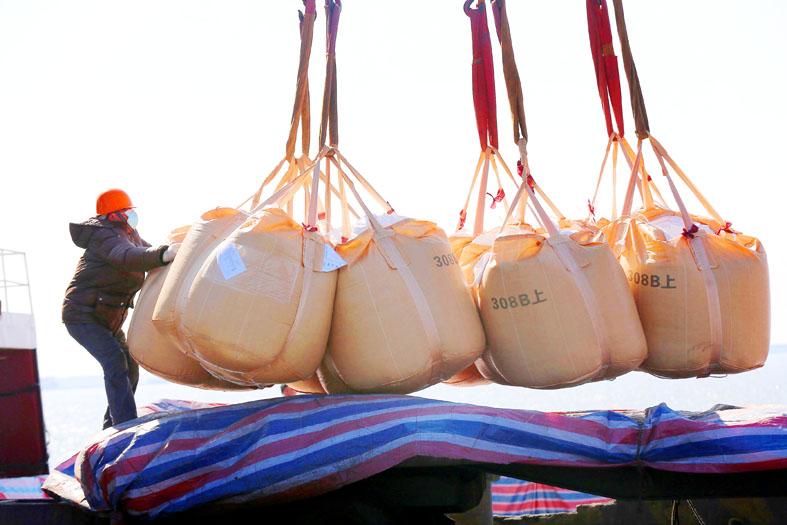China is facing “unprecedented” difficulty in stabilizing trade next year as favorable conditions that boosted export growth this year would not be sustainable, Chinese Vice Minister of Commerce Ren Hongbin (任鴻斌) told a briefing in Beijing yesterday.
Export gains might slow as competing countries recover their production capacities and as inflation that pushed up export values gradually eases, Ren said.
This year’s rapid export gains also make the base of comparison higher for next year, he added.

Photo: Reuters
The Chinese government would enhance trade companies’ awareness and ability to manage foreign exchange risks, Ren said.
Beijing would also step up efforts to ease pressures from international logistics and supply chain problems, he said, vowing to ensure the supply of commodities.
The government would “make every effort to keep foreign trade running within a reasonable range,” Ren said.
These cross-cyclical measures are meant to help stabilize trade early next year, he said.
He expected that China’s goods imports and exports would grow more than 20 percent this year to a total of US$6 trillion.
Ren’s comments echo concerns raised earlier this week by Chinese Minister of Commerce Wang Wentao (王文濤), who said it would be hard for China to keep its trade growth stable next year.
China’s exports have stayed resilient throughout the year, providing some support for an economy that has been weighed down by regulatory crackdowns and repeated COVID-19 outbreaks. Overseas shipments have posted double-digit percentage gains in every month this year, with the exception of February, when shipments jumped 155 percent from a slump last year.
However, the outlook for trade is less certain, as overseas appetite for Chinese goods is set to weaken if the global economic recovery loses steam. Chinese exporters are also battling high raw material prices, as well as surging labor and freight costs.
China would extend some personal income tax breaks, with certain measures to benefit high earners more, as the government seeks to encourage household spending as part of efforts to stimulate economic growth.
Preferential taxes on year-end bonuses would stay in place until the end of 2023, lower taxation on equity incentives would continue through next year and exemptions on some tax payments would be given to low-income earners, the Chinese State Council said in a statement on Wednesday.
The measures would reduce annual personal income tax revenue by 110 billion yuan (US$17.3 billion), the statement said.
For a high-end earner with a year-end extra payment of 500,000 yuan, the extended tax break on bonuses could help save about 77,000 yuan, Bloomberg calculated.
“The Chinese economy still needs policy support, and tax cuts are an important stimulus,” said Jiao Ruijin (焦瑞進), a member of the Chinese Tax Institute, an organization affiliated with the Chinese State Taxation Administration.

Intel Corp chief executive officer Lip-Bu Tan (陳立武) is expected to meet with Taiwanese suppliers next month in conjunction with the opening of the Computex Taipei trade show, supply chain sources said on Monday. The visit, the first for Tan to Taiwan since assuming his new post last month, would be aimed at enhancing Intel’s ties with suppliers in Taiwan as he attempts to help turn around the struggling US chipmaker, the sources said. Tan is to hold a banquet to celebrate Intel’s 40-year presence in Taiwan before Computex opens on May 20 and invite dozens of Taiwanese suppliers to exchange views

Application-specific integrated circuit designer Faraday Technology Corp (智原) yesterday said that although revenue this quarter would decline 30 percent from last quarter, it retained its full-year forecast of revenue growth of 100 percent. The company attributed the quarterly drop to a slowdown in customers’ production of chips using Faraday’s advanced packaging technology. The company is still confident about its revenue growth this year, given its strong “design-win” — or the projects it won to help customers design their chips, Faraday president Steve Wang (王國雍) told an online earnings conference. “The design-win this year is better than we expected. We believe we will win

Chizuko Kimura has become the first female sushi chef in the world to win a Michelin star, fulfilling a promise she made to her dying husband to continue his legacy. The 54-year-old Japanese chef regained the Michelin star her late husband, Shunei Kimura, won three years ago for their Sushi Shunei restaurant in Paris. For Shunei Kimura, the star was a dream come true. However, the joy was short-lived. He died from cancer just three months later in June 2022. He was 65. The following year, the restaurant in the heart of Montmartre lost its star rating. Chizuko Kimura insisted that the new star is still down

While China’s leaders use their economic and political might to fight US President Donald Trump’s trade war “to the end,” its army of social media soldiers are embarking on a more humorous campaign online. Trump’s tariff blitz has seen Washington and Beijing impose eye-watering duties on imports from the other, fanning a standoff between the economic superpowers that has sparked global recession fears and sent markets into a tailspin. Trump says his policy is a response to years of being “ripped off” by other countries and aims to bring manufacturing to the US, forcing companies to employ US workers. However, China’s online warriors